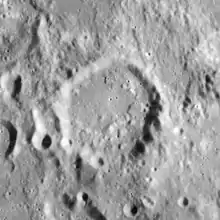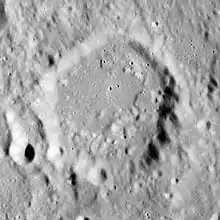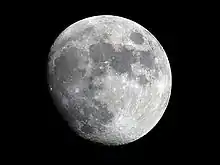Anděl (crater)
Anděl is a lunar impact crater that lies in the rugged central highlands of the Moon. It was named after the Czech astronomer Karel Anděl.[1] Nearby craters of note include Abulfeda to the south-southeast and Descartes to the east-southeast. About 85 kilometres to the east-northeast of the outer rim is the landing site of the Apollo 16 mission.
 Lunar Orbiter 4 image | |
| Coordinates | 10.4°S 12.4°E |
|---|---|
| Diameter | 35 km |
| Depth | 1.3 km |
| Colongitude | 348° at sunrise |
| Eponym | Karel Anděl |


The eroded outer rim of Anděl has been worn and distorted into a polygonal shape, and is nearly non-existent to the south where Anděl G intersects the perimeter. The interior floor is nearly flat, with some irregularities to the southeast. There is a tiny craterlet located just to the southeast of the midpoint, but no central peak of any significance.
Satellite craters
By convention these features are identified on lunar maps by placing the letter on the side of the crater midpoint that is closest to Anděl.
| Anděl | Latitude | Longitude | Diameter |
|---|---|---|---|
| A | 10.8° S | 11.3° E | 14 km |
| C | 9.0° S | 11.2° E | 3 km |
| D | 10.8° S | 11.7° E | 6 km |
| E | 12.0° S | 12.2° E | 6 km |
| F | 8.3° S | 11.1° E | 9 km |
| G | 11.0° S | 12.4° E | 4 km |
| H | 6.7° S | 11.3° E | 6 km |
| J | 7.5° S | 11.4° E | 6 km |
| K | 5.8° S | 11.6° E | 4 km |
| M | 9.7° S | 11.1° E | 27 km |
| N | 10.2° S | 11.4° E | 8 km |
| P | 11.6° S | 12.3° E | 19 km |
| S | 11.4° S | 12.7° E | 4 km |
| T | 11.2° S | 13.3° E | 4 km |
| W | 12.4° S | 12.3° E | 12 km |
References
- "Anděl (crater)". Gazetteer of Planetary Nomenclature. USGS Astrogeology Research Program.
- Andersson, L. E.; Whitaker, E. A. (1982). NASA Catalogue of Lunar Nomenclature. NASA RP-1097.CS1 maint: ref=harv (link)
- Bussey, B.; Spudis, P. (2004). The Clementine Atlas of the Moon. New York: Cambridge University Press. ISBN 978-0-521-81528-4.CS1 maint: ref=harv (link)
- Cocks, Elijah E.; Cocks, Josiah C. (1995). Who's Who on the Moon: A Biographical Dictionary of Lunar Nomenclature. Tudor Publishers. ISBN 978-0-936389-27-1.CS1 maint: ref=harv (link)
- McDowell, Jonathan (July 15, 2007). "Lunar Nomenclature". Jonathan's Space Report. Retrieved 2007-10-24.CS1 maint: ref=harv (link)
- Menzel, D. H.; Minnaert, M.; Levin, B.; Dollfus, A.; Bell, B. (1971). "Report on Lunar Nomenclature by the Working Group of Commission 17 of the IAU". Space Science Reviews. 12 (2): 136–186. Bibcode:1971SSRv...12..136M. doi:10.1007/BF00171763.
- Moore, Patrick (2001). On the Moon. Sterling Publishing Co. ISBN 978-0-304-35469-6.CS1 maint: ref=harv (link)
- Price, Fred W. (1988). The Moon Observer's Handbook. Cambridge University Press. ISBN 978-0-521-33500-3.CS1 maint: ref=harv (link)
- Rükl, Antonín (1990). Atlas of the Moon. Kalmbach Books. ISBN 978-0-913135-17-4.CS1 maint: ref=harv (link)
- Webb, Rev. T. W. (1962). Celestial Objects for Common Telescopes (6th revised ed.). Dover. ISBN 978-0-486-20917-3.CS1 maint: ref=harv (link)
- Whitaker, Ewen A. (1999). Mapping and Naming the Moon. Cambridge University Press. ISBN 978-0-521-62248-6.CS1 maint: ref=harv (link)
- Wlasuk, Peter T. (2000). Observing the Moon. Springer. ISBN 978-1-85233-193-1.CS1 maint: ref=harv (link)
External links
| Wikimedia Commons has media related to Andel (crater). |
- Anděl at The Moon Wiki
- Wood, Charles (November 8, 2009). "Somewhere Over the Rainbow". Lunar Photo of the Day.

